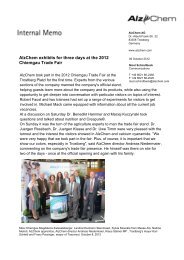Code of Conduct - AlzChem
Code of Conduct - AlzChem
Code of Conduct - AlzChem
- No tags were found...
Create successful ePaper yourself
Turn your PDF publications into a flip-book with our unique Google optimized e-Paper software.
AMMPL (BME)<strong>Code</strong> <strong>of</strong> <strong>Conduct</strong>Notes
AMMPL (BME)<strong>Code</strong> <strong>of</strong> <strong>Conduct</strong>The AMMPL and its members are aware <strong>of</strong> their social responsibility. All those involved inthe procurement process as intermediaries between their own company and suppliers ineach <strong>of</strong> the supply markets bear a particular responsibility towards their own company,towards customers and suppliers, towards the environment and towards society.That is why AMMPL created a <strong>Code</strong> <strong>of</strong> <strong>Conduct</strong> which is explained below. The AMMPL<strong>Code</strong> <strong>of</strong> <strong>Conduct</strong> is a voluntary code that is intended to put substance behind the interest<strong>of</strong> the Association Materials Management, Purchasing and Logistics and its members inupholding fair, sustainable, responsible, and ethical principles <strong>of</strong> conduct.The AMMPL <strong>Code</strong> <strong>of</strong> <strong>Conduct</strong> represents a minimum standard. It is up to each company torecognise the AMMPL <strong>Code</strong> <strong>of</strong> <strong>Conduct</strong> (to submit to it), and each company is at liberty tointroduce further codes <strong>of</strong> conduct with higher requirements <strong>of</strong> ethical practice for itself andits employees.The AMMPL <strong>Code</strong> <strong>of</strong> <strong>Conduct</strong> is organised in the following modular format:IIIIIIIIIIVVPreambleGeneral Principles, Laws and Statutes1. Corruption / Anti-Trust Law / Forced Labour / Child Labour2. Principles promoting Social ResponsibilitySuppliersCompliance
IPreambleIn the preamble the ethical frame <strong>of</strong> reference is established. This is also where theobjectives <strong>of</strong> the Global Compact are mentioned. The AMMPL <strong>Code</strong> <strong>of</strong> <strong>Conduct</strong> is alsoguided by additional internationally-recognised standards.With a firm grounding in the Global Compact, an internationally-recognised frame <strong>of</strong>reference is to be established. This is also intended to serve the objective <strong>of</strong> aligning the<strong>Code</strong> with internationally-recognised standards.The statements in the Global Compact are to be construed as a frame <strong>of</strong> reference. TheAMMPL <strong>Code</strong> <strong>of</strong> <strong>Conduct</strong> does not associate any concrete rights and obligations with thereference to the Global Compact and other international standards.IIGeneral Principles, Laws and StatutesSections II and III contain the material duties that the companies recognise.These reflect the current legal framework in the Federal Republic <strong>of</strong> Germany andinternationally-recognised standards.Section II obliges the company recognising the AMMPL <strong>Code</strong> <strong>of</strong> <strong>Conduct</strong> to obey laws andstatutes.This is spelled out more clearly in the subsequent Section III with respect to particularlycritical areas <strong>of</strong> business relationships.
III1. Corruption / Anti-Trust Law / Forced Labour / Child LabourSection III 1 substantiates the duties <strong>of</strong> a company recognising the AMMPL <strong>Code</strong> <strong>of</strong><strong>Conduct</strong> with regard to corrupt practices, violations against fair competition (anti-trust law),child labour as well as forced labour.The duties are thus a reflection <strong>of</strong> current legal status.Section III 1. a) reviews the legal status in the field <strong>of</strong> criminal legal conventions againstcorruption – with a special emphasis on crimes in business dealings.Basic principles are put forth with regard to gifts, invitations to entertainment etc.Accordingly, management and employees <strong>of</strong> a company recognising the AMMPL <strong>Code</strong> <strong>of</strong><strong>Conduct</strong> are not allowed in the course <strong>of</strong> business dealings to <strong>of</strong>fer, promise, demand, giveor accept gifts, payments, invitations or services that are provided with the aim <strong>of</strong>influencing a business relationship in a prohibited way or with whom there is the risk <strong>of</strong>jeopardising the pr<strong>of</strong>essional independence <strong>of</strong> the business partner. This generally doesnot apply to gifts and invitations that fall within the bounds <strong>of</strong> normal business practice withregard to hospitality, convention and courtesy.For reasons <strong>of</strong> practicality, there is then a reference to the opportunity for each company toissue more specific internal codes <strong>of</strong> conduct.The AMMPL <strong>Code</strong> <strong>of</strong> <strong>Conduct</strong> in this context provides for designating a person who can becontacted when employees <strong>of</strong> the recognising company are in a conflict <strong>of</strong> interest or areuncertain whether a conflict <strong>of</strong> interest exists or could arise. The reasons for this are thefollowing: There are frequently cases in which it is not clear whether a certain behaviour iscorrupt (cases <strong>of</strong> doubt/conflicts <strong>of</strong> interest). This requires a person / function to beinstalled that is authorised to address these issues and (if needed, with consultation <strong>of</strong>third parties) evaluate them and provide answers. At the same time, this person is to beable to investigate any causes for suspicion. This does not include prescriptions aboutorganisational responsibilities ("assumption <strong>of</strong> additional duties, exclusive assumption <strong>of</strong>duties, internal or external 'ombudsman' solution etc).Section III 1. b) reviews the legal status with regard to fair competition (anti-trust law). Socalledhardcore cartels are explicitly mentioned.
With regard to the fact that there are cases <strong>of</strong> doubt that may range between forbiddencartels and permissible collaboration, the company recognising the AMMPL <strong>Code</strong> <strong>of</strong><strong>Conduct</strong> is obliged to designate a contact person. Generally the provisions concerning"Corruption" apply to the contact person.Furthermore, the company recognising the AMMPL <strong>Code</strong> <strong>of</strong> <strong>Conduct</strong> commits to rejectingevery form <strong>of</strong> forced labour (Section III 1 c)) and to respect the regulations <strong>of</strong> the UnitedNations on child labour – to the extent that national regulations do not provide for strictermeasures – (Section III 1 d)).III2. Principles promoting Social ResponsibilitySection III 2 spells out the duties in the various fields <strong>of</strong> human rights, discrimination,protection <strong>of</strong> health, fair working conditions, environmental protection and companysecrets.IVSuppliersSection IV provides for including the above-mentioned themes in the supply chain.Whereby this is confined to so-called Business <strong>Conduct</strong> Rules from III 1 (corruption, antitrustlaw, forced labour, child labour). The company recognising the AMMPL <strong>Code</strong> <strong>of</strong><strong>Conduct</strong> commits to promoting these principles to the best <strong>of</strong> its ability among thecompany's suppliers.VComplianceSection V governs compliance with AMMPL <strong>Code</strong> <strong>of</strong> <strong>Conduct</strong>. The AMMPL <strong>Code</strong> <strong>of</strong><strong>Conduct</strong> provides that a company recognising the <strong>Code</strong> may introduce further codes <strong>of</strong>conduct with higher requirements <strong>of</strong> ethical practice for itself and its employees.Furthermore, it is the duty <strong>of</strong> a company recognising the AMMPL <strong>Code</strong> <strong>of</strong> <strong>Conduct</strong> toinform its employees <strong>of</strong> the issues governed by the AMMPL <strong>Code</strong> <strong>of</strong> <strong>Conduct</strong> and theresulting obligations. Thus there is a duty to publicise the content <strong>of</strong> the <strong>Code</strong>. To theextent that a company recognising the AMMPL <strong>Code</strong> <strong>of</strong> <strong>Conduct</strong> has introduced a code <strong>of</strong>conduct that is at least equivalent to the AMMPL <strong>Code</strong> <strong>of</strong> <strong>Conduct</strong>, it is not absolutelynecessary to publicise the exact "text" <strong>of</strong> the AMMPL <strong>Code</strong> <strong>of</strong> <strong>Conduct</strong>. There is noprescribed form <strong>of</strong> publication (such as Intranet, inclusion in labour contracts, training etc.).
A company recognising the AMMPL <strong>Code</strong> <strong>of</strong> <strong>Conduct</strong> is to provide AMMPL with the name<strong>of</strong> a responsible contact person for the AMMPL <strong>Code</strong> <strong>of</strong> <strong>Conduct</strong> who can providedefinitive answers about compliance with the AMMPL <strong>Code</strong> <strong>of</strong> <strong>Conduct</strong>. The company is totake proper organisational steps to ensure that the AMMPL <strong>Code</strong> <strong>of</strong> <strong>Conduct</strong> is upheld bythe company and its management. This is achieved especially through the introduction andmaintenance <strong>of</strong> appropriate controls and plausibility checks.The contact person is the AMMPL interface into the company, which through its"Declaration <strong>of</strong> Accession" recognises the AMMPL <strong>Code</strong> <strong>of</strong> <strong>Conduct</strong>, and vice-versa. Thecontact person is the individual authorised to provide definitive information to the AMMPLabout compliance with the AMMPL <strong>Code</strong> <strong>of</strong> <strong>Conduct</strong>. Hereby he can rely on the internalcompany organisational structures and job responsibilities. There is no prescription <strong>of</strong>internal responsibilities within companies. The company must, however, provide thecontact person with a sufficient level <strong>of</strong> authority, in order for him to obtain informationwithin the organisation to form the basis <strong>of</strong> his responses.Frankfurt, 10th November 2008






